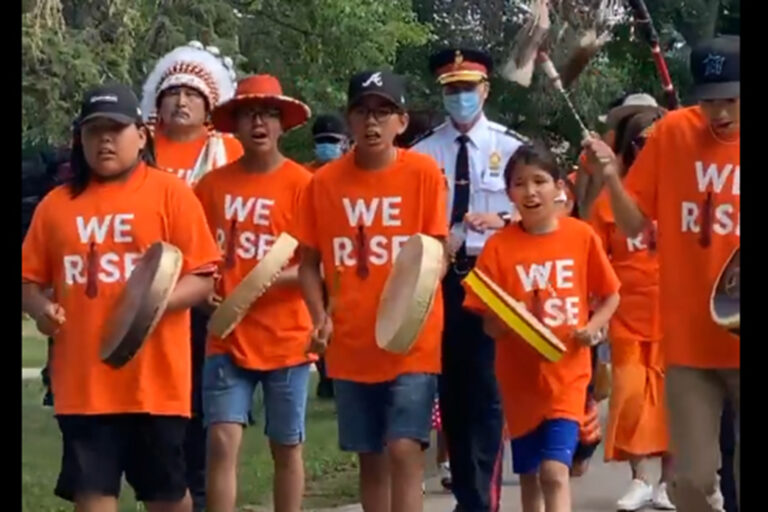
For nearly 12 years, Vera Roy has devoted her life to finding out what happened to her niece.
Michelle Sanderson was in Edmonton when she was found murdered on Oct. 8, 2009. The murderer has never been caught, and for a while, Edmonton police considered it a cold case. Recently, detectives have started looking into it again.
“It’s been a long journey for us,” Roy said. “There are people out there who know something who haven’t said something.”
Roy and her family are searching for justice, closure, and healing. They haven’t had the first two since the perpetrator remains at large, but on Thursday morning they received some of the third.
Roy, another niece, Mandy, and other family members were in Prince Albert for the 15th annual walk to honour the memory of Canada’s many missing and murdered Indigenous women and girls. It’s an emotional day for them, but an important one.
“It’s been a healing journey for us every year when we come here,” Roy said.
“It’s nice that people are reaching out to me now in regards to the cold case, because I’m not going to let it go. I can’t. As long as I’m on this earth, I will continue to advocate for our murdered sister, daughter and niece, Michelle.”
Many of the attendees who walked down Central Avenue from the new MMIWG monument to Kinsmen Park know the pain of losing a family member. For some, the wounds are still fresh.
Herman Michell’s sister, a Carleton University graduate with a master’s degree in linguistics, was murdered in 2019. Thursday’s walk was the first he’d ever attended, and he did it for his sister.
“They wanted me to speak (at the monument unveiling), but I said no,” Michell said. “It’s too emotional for me, but today, it’s a good walk.”
Michell said it’s probably going to take a while to reduce the number of Indigenous people who are missing and murdered, but he’s confident Canada is heading in the right direction. People are mobilizing, he said, and police forces are listening. Unsolved files are being reopened, family members are speaking out, and Canadians are taking the issue seriously.
“It’s going to take a long time because of what we have in Canada: systemic racism, but people are rallying together,” he said. “I think this is the best country in the world. We have a democratic society, and we have a chance to speak out.”
“More and more people are doing this across Canada,” he added. “It’s not only here, but we have lots of missing and murdered Indigenous women and girls—and men and boys too—in our territory here in Prince Albert. The monument that out there, some of the faces are facing north, and that’s a message that we need to look to the north as well.”
Missing and murdered friends and family members aren’t the only reason attendees showed up. Many said they were stunned by the revelation of 215 unmarked graves at the site of a former residential school in Kamloops, B.C., and that jolted them into action.
Southend resident Victoria Clarke said the news showed her just how much unacknowledged pain there was out there, and how many Indigenous people needed to heal. She said Thursday’s walk was a great opportunity to start that process.
“We need to heal. There’s just so much trauma, but we need to stop focusing on our pain and focus on our healing, and this is helping us,” Clarke said shortly after the walk ended. “They’re going to be doing a healing circle, and I’m already feeling emotional.”
Like many attendees, Clarke walked down Central Avenue in an Orange shirt with several members of her family. Like other attendees, she also knows the pain of having a family member murdered. The anniversary of the death is just days away on July 13, which makes Thursday’s walk even more important.
It’s walks like this, she said, that keep the murders and disappearances in the news, and give families something to rally around.
“Even when we had our walk last year, it seems like that awareness was awakened again,” she said. “It’s like it goes dormant for a while, but when you do stuff like this, it seems to bring more action, so this is very important for us. Very important.”
Correction: This story has been updated to correct the spelling of Herman Michell’s last name, and the name of the residential school site in Kamloops. The Daily Herald apologizes for the errors.
